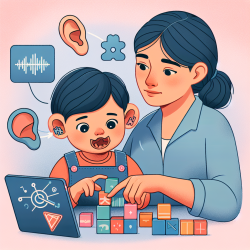Key Findings from the Study
The study, which involved 67 parents of preschoolers with communication disorders, explored two primary aspects:- Parents' perspectives on the child-SLP relationship (Environmental Factors)
- Parents' perspectives on changes in children's functional communication (Activities and Participation)
Significant Gains in Functional Communication
The research found that parents of preschoolers who received intervention reported significantly greater gains in their children's functional communication compared to those who did not receive intervention. This highlights the importance of speech and language intervention in improving children's ability to communicate effectively in everyday environments.Positive Child-SLP Relationships
An overwhelming majority of parents (94%) provided positive or very positive perspectives on the child-SLP relationship. Key themes identified included:- Rapport with Child: Parents valued the interactions between their child and the SLP, noting that a good rapport contributed to their child's enjoyment and engagement in therapy.
- Professional Competence: Parents appreciated the SLPs' clinical skills and their ability to manage their child's personality, which they felt contributed to their child's progress in therapy.
Implementing Research Outcomes in Practice
Based on these findings, SLPs can take several steps to enhance their practice:- Focus on Building Rapport: Establishing a positive and engaging relationship with the child can significantly impact the effectiveness of therapy. SLPs should strive to create a welcoming and enjoyable environment for their young clients.
- Demonstrate Professional Competence: Parents value SLPs who display strong clinical skills and can effectively address their child's communication needs. Continuous professional development and staying updated with the latest research can help SLPs maintain high standards of practice.
- Incorporate Parental Feedback: Engaging parents in the therapeutic process and considering their perspectives can provide valuable insights and improve the overall effectiveness of intervention strategies.
Encouraging Further Research
While this study provides important insights, there is always room for further research. SLPs are encouraged to:- Explore additional factors that contribute to successful child-SLP relationships and positive therapeutic outcomes.
- Investigate the long-term impacts of speech and language intervention on children's functional communication.
- Examine the role of family-centered practices in enhancing therapeutic outcomes.
Conclusion
The findings from this study underscore the importance of considering parental perspectives in speech-language pathology. By focusing on building strong child-SLP relationships and demonstrating professional competence, SLPs can create more effective and meaningful therapeutic experiences for children with communication disorders.To read the original research paper, please follow this link: Parents Perspectives on the Professional-Child Relationship and Childrens Functional Communication Following Speech-Language Intervention










